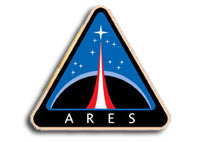ATK and NASA Conduct Successful Ground Test of Ares I Igniter

ATK Test Qualifies Upgraded Material Leading to Higher Performance
ATK to Integrate new Igniter into Five-Segment Ares I Rocket for Test This Fall
Alliant Techsystems (NYSE: ATK) successfully conducted the first test firing of the igniter that will be used on NASA’s Ares I first stage. Today’s test at ATK’s Promontory, Utah facility generated a flame almost 200 feet in length. When ignited inside the world’s largest solid rocket booster, this flame will trigger the liftoff of the rocket that will send future astronauts into orbit. Today’s test prepares the way for the first ground test of the fully-developed Ares I first stage, a five-segment derivative of the Space Shuttle Reusable Solid Rocket Motor, scheduled for next fall.
The Ares I igniter is the same flight-proven design used on the Shuttle’s Solid Rocket Boosters (SRBs). This igniter, however, takes advantage of upgraded materials to provide higher performance in the liner and insulation. The new liner thermal properties are equivalent to those of the shuttle, but its stress/strain capability is 100 percent greater. The new insulation is also 20 percent lighter than the insulation currently on the Space Shuttle fleet, providing valuable weight savings and higher performance. Initial data showed the igniter performed as expected.
“Utilizing heritage technology gives us a baseline that is very well understood and identifies how upgraded technologies can benefit the Ares I,” said Mike Kahn, ATK Space Systems executive vice president. “Like many other design features of Ares I first stage, the tremendous knowledge base from the Space Shuttle program enables us to conduct the first test of the Ares I first stage as early as this fall.”
The Ares I/shuttle igniter is the largest igniter ATK produces, measuring approximately 18 inches in diameter and 36 inches long. The igniter is a small, high-burn-rate solid rocket motor that is secured in the forward segment of the five-segment booster. Once the command is sent to the igniter, the ignition sequence begins sending the flame down the core of the 142-foot solid rocket booster. In less than a second, the booster generates more than 3.5 million pounds of thrust.
The objective of today’s ground test was to begin qualification of the new materials for the Ares I igniter. The same insulation and liner materials are also being used in the booster segments of ATK’s Development Motor-1, scheduled to be ground tested this fall.
Since the development of Apollo and Shuttle, ground testing remains a critical step during the development and operation of any human spaceflight program. With the charge to “test as you fly,” ATK has conducted 51 ground tests of NASA’s Solid Rocket Booster and 62 additional igniter tests over a thirty-year period.
ATK is a premier aerospace and defense company with more than 17,000 employees in 21 states and $4.5 billion in revenue. News and information can be found on the Internet at www.atk.com.
Certain information discussed in this press release constitutes forward-looking statements as defined in the Private Securities Litigation Reform Act of 1995. Although ATK believes that the expectations reflected in such forward-looking statements are based on reasonable assumptions, it can give no assurance that its expectations will be achieved. Forward-looking information is subject to certain risks, trends and uncertainties that could cause actual results to differ materially from those projected. Among those factors are: assumptions related to the test schedule and performance of the Ares I first stage; changes in governmental spending, budgetary policies and product sourcing strategies; the company’s competitive environment; the terms and timing of awards and contracts; and economic conditions. ATK undertakes no obligation to update any forward-looking statements. For further information on factors that could impact ATK, and statements contained herein, please refer to ATK’s most recent Annual Report on Form 10-K and any subsequent quarterly reports on Form 10-Q and current reports on Form 8-K filed with the U.S. Securities and Exchange Commission.









